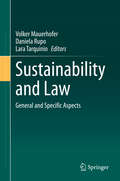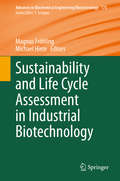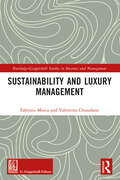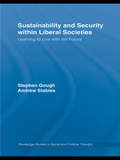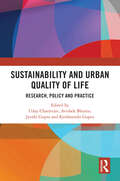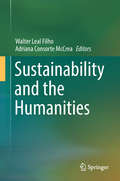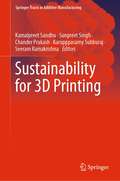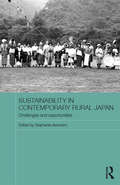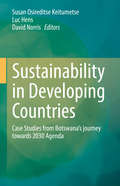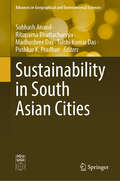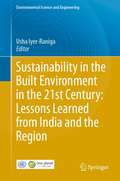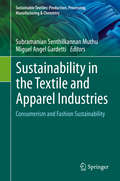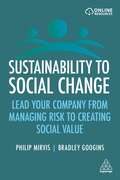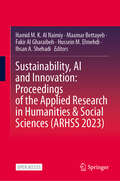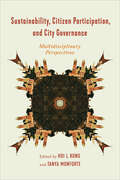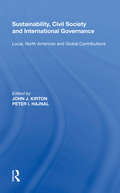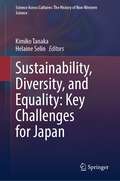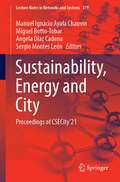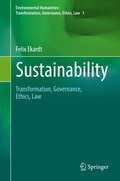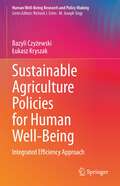- Table View
- List View
Sustainability and Law: General and Specific Aspects
by Volker Mauerhofer Daniela Rupo Lara TarquinioThe book discusses sustainability and law in a multifaceted way. Together, sustainability and law are an emerging challenge for research and science. This volume contributes through an interdisciplinary concept to its further exploration. The contributions explore this exciting domain with innovative ideas and replicable approaches. It combines a variety of authors, from both the public and the private sectors, and thereby guarantees a broad view that enshrines the more theoretical arguments from the academic side as well as stronger practical applicable perspectives. The book provides space for thoughtful expansions of established theories as well as the hopeful emergence of innovative ideas. Moreover, the combination of three to five contributions into the eleven parts respectively aims toward a compression of like minded thoughts. This should lead to an intensification of exchange of viewpoints from different angles on a similar theme. Readers therefore also have the opportunity to concentrate on single chapters, but receive comprised knowledge and a variety of thoughts for new ideas on a particular theme.
Sustainability and Life Cycle Assessment in Industrial Biotechnology (Advances in Biochemical Engineering/Biotechnology #173)
by Magnus Fröhling Michael HieteThis book reviews the assessment of industrial biotechnology products and processes from a sustainable perspective. Industrial Biotechnology is a comparably young field which comes along with high expectations with regard to sustainability issues. These stem from the promise of reducing greenhouse gas emissions and replacing fossil resources in the near or later future and using green technology, i.e. more environmentally friendly technologies. The intended economic, ecological and social benefits, however, need to be proven, resulting in a variety of challenges, both from a methodological and application point of view. In this book, specific assessment and application topics of industrial biotechnology are addressed, highlighting challenges and solutions for both developers and users of assessment methods. In twelve chapters, experts in their particular fields define the scope, characterize industrial biotechnology and show in their contributions the state of the art, challenges and prospects of assessing industrial biotechnology products and processes.The chapter 'Societal and Ethical Aspects of Industrial Biotechnology' of this book is available open access under a CC BY 4.0 license at link.springer.com
Sustainability and Luxury Management (Routledge-Giappichelli Studies in Business and Management)
by Fabrizio Mosca Valentina ChiaudanoRecently, sustainability has become a focal point for companies across all sizes and sector, and the luxury industry is no exception. This shift reflects a growing awareness of the environmental, social, and community impacts of business activities. However, integrating sustainability into the luxury industry poses unique challenges due to the apparent mismatch between luxury and sustainability. While luxury often connotes indulgence and opulence, sustainability emphasizes altruism, ethical practices, and moderation, seemingly conflicting with traditional luxury values. This book, first attempts to resolve the abovementioned divergence between luxury and sustainability. Thanks to an in-depth analysis of the definition of luxury, the authors demonstrate that sustainability is in line with the young consumers’ idea of luxury. Moreover, leveraging a structured review, the book organizes the scientific production on sustainable luxury in the research area and explains the reasons for matching luxury and sustainability. Then this book also attempts to explain to what extent luxury brand companies are improving their commitment to sustainable actions. In this endeavor, the authors explore the fundamental issues within sustainable luxury and the integration of sustainability into the corporate business model. The explorations also include the companies’ efforts to communicate sustainability both offline and online with a focus on the themes and tools. Finally, this book offers a benchmark by providing the audience with several business cases. The discussion of case studies aims to meet the needs of a wide and varied audience, from university students to CSR managers looking to extract valuable insights and adapt them to their respective business contexts.
Sustainability and Security within Liberal Societies: Learning to Live with the Future (Routledge Studies in Social and Political Thought #Vol. 58)
by Stephen Gough Andrew StablesMuch of the world will be living in broadly "liberal" societies for the foreseeable future. Sustainability and security, however defined, must therefore be considered in the context of such societies, yet there is very little significant literature that does so. Indeed, much ecologically-oriented literature is overtly anti-liberal, as have been some recent responses to security concerns. This book explores the implications for sustainability and security of a range of intellectual perspectives on liberalism, such as those offered by John Rawls, Robert Nozick, Frederick Hayek, Ronald Dworkin, Michael Oakeshott, Amartya Sen and Jürgen Habermas.
Sustainability and Urban Quality of Life: Research, Policy and Practice
by Uday Chatterjee, Avishek Bhunia, Jyothi Gupta and Krishnendu GuptaThis book conceptualizes and synthesizes worldwide research on the quality of urban life. It looks at quality of life within urban cities analysing amenities, infrastructure and assets while also bringing in the discourse around scarcity, disparity, accessibility, sustainability, equity, and well-being.Organized into four major parts, the book reflects on the interconnections between theories and practice and through a multi-disciplinary approach focuses on the aspects of urban environment and planning that makes cities inclusive, safe, resilient, smart, and sustainable. This book highlights the enormous strain on urban areas due to severe scarcity of civic systems and provides an in-depth look into urban concerns and pressing challenges from a global perspective, as well as many planning approaches to solving these problems.This book will be useful to students, researchers and teachers working in the field of urban studies, remote sensing and GIS, planning and sustainability, sustainable development, urban geography, development geography and population geography. This book would also be an invaluable companion to thought leaders, policy makers and industry and other professionals working in the field of urban planning and human development.
Sustainability and the Humanities
by Walter Leal Filho Adriana Consorte McCreaThis book explores the strong links between sustainability and the humanities, which go beyond the inclusion of social sciences in discussions on sustainability, and offers a holistic discussion on the intellectual and moral aspects of sustainable development. The contributions from researchers in the fields of education, social sciences, religion, humanities, and sustainable development fulfill three main aims:They provide university lecturers interested in humanities and sustainable development with an opportunity to present their work;foster the exchange of information, ideas and experiences acquired in the execution of teaching and research; anddiscuss methodological approaches and projects that provide a better understanding of how the humanities can contribute to the debate on sustainable development. Prepared by the Inter-University Sustainable Development Research Programme and the World Sustainable Development Research and Transfer Centre, the book reiterates the need to promote integrated approaches to sustainable development. Including practice-based lessons learnt that can be replicated further, it is a valuable resource for scientists and practitioners working in the humanities and sustainable development.
Sustainability for 3D Printing (Springer Tracts in Additive Manufacturing)
by Seeram Ramakrishna Chander Prakash Sunpreet Singh Karupppasamy Subburaj Kamalpreet SandhuWith advancement in modern technology human life span in 21st century has significantly improved as compared to past centuries. Indeed, the manufacturing and household wastes have also boosted in the same era, presenting a hazardous condition to the various living beings. However, through smart methodologies, it can be possible to recycle/reuse of the different types of wastes as a feedstock convenient for specialized manufacturing technologies, such as 3D printing. This means that through proper facilities the waste can be used as the raw material for the printing technologies with characteristic at par with the virgin feedstock. Furthermore, producing the feedstock using waste materials will help to reduce the cost of the processing material, productivity and eco-friendliness of this manufacturing technology. This book will cover a boarder aspect of such efforts wherein various applications and state of art solutions will be discussed in a comprehensive way. This book will be much interest for academics, research and entrepreneur who are working in the field materials science, 3D printing, and manufacturing because of its coverage of state of art solution in the field of commercial, industrial and healthcare products.
Sustainability in Contemporary Rural Japan: Challenges and Opportunities (Routledge Studies in Asia and the Environment)
by Stephanie AssmannRural communities in Japan have suffered from significant depopulation and economic downturn in post-war years. Low birth rates, aging populations, agricultural decline and youth migration to large cities have been compounded by the triple disaster of 11 March 2011, which destroyed farming and fishing communities and left thousands of people homeless. This book identifies these challenges and acknowledges that an era of post-growth has arrived in Japan. Through exploring new forms of regional employment, community empowerment, and reverse migration, the authors address potential opportunities and benefits that may help to create and ensure the quality of life in depopulating areas and post-disaster scenarios. This book will be of interest not only to students of Japanese society, but also to those outside of Japan who are seeking new approaches for tackling depopulation challenges.
Sustainability in Developing Countries: Case Studies from Botswana’s journey towards 2030 Agenda
by Susan Osireditse Keitumetse David Norris Luc HensThis book illustrates an alternative approach to ‘state of sustainability’ reporting by presenting cross-sectoral and multi-disciplinary discussions on sustainability issues in the context of a developing country, Botswana. The book volume illustrates how academic publishing can supplement African governments' existing forms of reporting on sustainability by providing on-ground detailed descriptions and experiences relating to achievement of the various sustainable development goals (SDGs). In addition, this process involves, increases and enhances diversity of stakeholders that report on sustainability. Furthermore, the approach resonates with the UN’s recommendation to build local strategies for implementation of the 2030 agenda for sustainable development. Conventional reporting on sustainability by most African countries is an exercise that is customarily the preserve of designated government ministries. While this form of reporting provides a consistent platform for tracking sustainable development goals, it can also benefit from juxtaposition with in-depth descriptions and experiences provided by academic publishing. Academia, through publishing, provides a framework for on-ground situation-analysis as well as in-depth descriptions of African country’s grass-root experiences, thus allowing for temporal tracking of sustainable development milestones. As this volume illustrates, experiences from the various contributors on this volume highlight different points of departure towards achieving the 2030 agenda. Topics covered include biodiversity, water management, world heritage, environment, education, tourism, gender, institutional approaches to achievement of SDGs, as well as contribution of non-governmental organisations (NGO)'s amongst others.
Sustainability in South Asian Cities (Advances in Geographical and Environmental Sciences)
by Subhash Anand Rituparna Bhattacharyya Pushkar K. Pradhan Madhushree Das Tulshi Kumar DasThis book explores some of the common socio-economic and environmental challenges faced by the cities of South Asia, which remain highly under-researched. South Asia comprises eight nations—India, Bangladesh, Nepal, Sri Lanka, Bhutan, Maldives, Pakistan, and Afghanistan, consisting of a total population of 1.92 billion in 2022. The majority of the cities in these countries are characterized by haphazard urbanization and multi-dimensional poverty alongside its associated ingredients— floods, water scarcity, food crises, poor sanitation, slums and squatter settlements, and pollution, among others. This comprehensive book is contributed by interdisciplinary scholars and includes 25 case studies. The volume brings these socio-economic and environmental challenges to the fore for a better and more nuanced understanding. The book help policymakers to mitigate the challenges and build sustainable cities.
Sustainability in the Built Environment in the 21st Century: Lessons Learned from India and the Region (Environmental Science and Engineering)
by Usha Iyer-RanigaThis book follows on previous works addressing sustainable development research in the Asia-Pacific region. It mainly focuses on India, a country currently facing immense challenges in the form of climate change, rapid urbanisation, and population pressures in its journey to help achieve the Sustainable Development Goals. Expecting to surpass China in terms of population in the near future, India needs to develop its own solutions in order to uphold its commitments under the Paris Agreement. This book makes a contribution in that direction by presenting case studies on various aspects of the built environment, from education to managing cities, procurement, and considerations for a circular economy. The papers gathered here offer a vital resource for government policymakers, educators, and current and future professionals, equipping them with the knowledge and expertise they need in order to overcome today’s complex challenges in the built environment.
Sustainability in the Global City
by Gary Mcdonogh Cindy Isenhour Gary McDonogh Melissa Checker Cindy IsenhourCities play a pivotal but paradoxical role in the future of our planet. As world leaders and citizens grapple with the consequences of growth, pollution, climate change, and waste, urban sustainability has become a ubiquitous catchphrase and a beacon of hope. Yet, we know little about how the concept is implemented in daily life - particularly with regard to questions of social justice and equity. This volume provides a unique and vital contribution to ongoing conversations about urban sustainability by looking beyond the promises, propaganda, and policies associated with the concept in order to explore both its mythic meanings and the practical implications in a variety of everyday contexts. The authors present ethnographic studies from cities in eleven countries and six continents. Each chapter highlights the universalized assumptions underlying interpretations of sustainability while elucidating the diverse and contradictory ways in which people understand, incorporate, advocate for, and reject sustainability in the course of their daily lives.
Sustainability in the Textile and Apparel Industries: Consumerism and Fashion Sustainability (Sustainable Textiles: Production, Processing, Manufacturing & Chemistry)
by Subramanian Senthilkannan Muthu Miguel Angel GardettiThis book is part of a five-volume set that explores sustainability in textile industry practices globally. Case studies are provided that cover the theoretical and practical implications of sustainable textile issues, including environmental footprints of textile manufacturing, consumer behavior, eco-design in clothing and apparels, supply chain sustainability, the chemistry of textile manufacturing, waste management and textile economics. The set will be of interest to researchers, engineers, industrialists, R&D managers and students working in textile chemistry, economics, materials science, and sustainable consumption and production. This volume focuses on sustainability aspects of consumerism and fashion, emphasizing the environmental issues that stem from textile care and disposal, and how many of these practices detrimentally impact the environment. Also addressed is the role of consumer knowledge and behavior associated with the clothing industry that may exacerbate these issues, and what can be done to better inform consumers about more sustainable options available to them. The case studies presented cover environmental and social sustainability in the clothing industry, and sustainable development in luxury fashion networks.
Sustainability in the Textile and Apparel Industries: Production Process Sustainability (Sustainable Textiles: Production, Processing, Manufacturing & Chemistry)
by Subramanian Senthilkannan Muthu Miguel Angel GardettiThis book is part of a five-volume set that explores sustainability in textile industry practices globally. Case studies are provided that cover the theoretical and practical implications of sustainable textile issues, including environmental footprints of textile manufacturing, consumer behavior, eco-design in clothing and apparels, supply chain sustainability, the chemistry of textile manufacturing, waste management and textile economics. The set will be of interest to researchers, engineers, industrialists, R&D managers and students working in textile chemistry, economics, materials science, and sustainable consumption and production.This volume addresses the technologies and mechanical processes of textile production, and what sustainable methods can be employed to achieve improved safety and environmental health. The book covers sustainable aspects of printing, dyeing, coloration, weaving, knitting, tailoring, surface design and antimicrobial finishing for environmentally friendly textile and apparel products.
Sustainability in the Textile and Apparel Industries: Sourcing Natural Raw Materials (Sustainable Textiles: Production, Processing, Manufacturing & Chemistry)
by Subramanian Senthilkannan Muthu Miguel Angel GardettiThis book is part of a five-volume set that explores sustainability in textile industry practices globally. Case studies are provided that cover the theoretical and practical implications of sustainable textile issues, including environmental footprints of textile manufacturing, consumer behavior, eco-design in clothing and apparels, supply chain sustainability, the chemistry of textile manufacturing, waste management and textile economics. The set will be of interest to researchers, engineers, industrialists, R&D managers and students working in textile chemistry, economics, materials science, and sustainable consumption and production. This volume comprehensively covers the various sustainable natural materials used in textiles that originate from raw materials sourcing. The book discusses agricultural production systems and standards for the development of sustainable textile fibers, the effects of chemical surface modification methods on the properties of textile fibers, and how antibacterial and antifungal textiles can be manufactured using natural resources.
Sustainability in the Textile and Apparel Industries: Sourcing Synthetic and Novel Alternative Raw Materials (Sustainable Textiles: Production, Processing, Manufacturing & Chemistry)
by Subramanian Senthilkannan Muthu Miguel Angel GardettiThis book is part of a five-volume set that explores sustainability in textile industry practices globally. Case studies are provided that cover the theoretical and practical implications of sustainable textile issues, including environmental footprints of textile manufacturing, consumer behavior, eco-design in clothing and apparels, supply chain sustainability, the chemistry of textile manufacturing, waste management and textile economics. The set will be of interest to researchers, engineers, industrialists, R&D managers and students working in textile chemistry, economics, materials science, and sustainable consumption and production. This volume explores some alternative synthetic raw materials resulting from the recycling and regeneration of renewable textile fibers, and how these sustainable green-based composites can contribute to improved ecological and human health. The book offers insights into the impacts of human-made fibers and microfiber pollution, and how biodegradable material sourcing can help to curb harmful environmental impacts from these practices and achieve clothing and apparel sustainability.
Sustainability in the Textile and Apparel Industries: Sustainable Textiles, Clothing Design and Repurposing (Sustainable Textiles: Production, Processing, Manufacturing & Chemistry)
by Subramanian Senthilkannan Muthu Miguel Angel GardettiThis book is part of a five-volume set that explores sustainability in textile industry practices globally. Case studies are provided that cover the theoretical and practical implications of sustainable textile issues, including environmental footprints of textile manufacturing, consumer behavior, eco-design in clothing and apparels, supply chain sustainability, the chemistry of textile manufacturing, waste management and textile economics. The set will be of interest to researchers, engineers, industrialists, R&D managers and students working in textile chemistry, economics, materials science, and sustainable consumption and production. This volume discusses novel trends and concepts in sustainable textile design, including innovative topics such as doodling and upcycling in clothing and apparel design for sustainable fashion initiatives. Along with strategies for repurposing fashion sustainability, the book also covers university interventions for the development of proper and environmentally friendly design practices. Specific technologies addressed include UV applications, laser treatments for dyeing, refined surface design techniques for products such as leather.
Sustainability to Social Change: Lead Your Company from Managing Risks to Creating Social Value
by Philip Mirvis Bradley GooginsIs your company using its talent to create social value? Or is it simply managing risks? To address the problems facing society and business today, sustainability is not good enough.Instead, companies need to do their part to lead social change. In Sustainability to Social Change, leadership and social innovation experts Philip Mirvis and Bradley K. Googins share their hands-on research to reveal how leaders can design and guide their companies to create more inclusive prosperity and become agents of social change. The book reveals the inside story of how socially innovative companies are making the strategic shift from minimizing risk to creating social value. It then outlines the strategies and practices that leaders can use to address the five biggest problems facing companies and society today: Purpose, Prosperity, Products, Planet and People. Filled with real life examples, hands-on guidelines and self-assessments to rate your company's performance, Sustainability to Social Change helps you pivot your company's mindset and practices in order to enhance society and the environment, and fuel its own success. Online resources include a guide to help employees become socially conscious, operate in a purposeful company, become allies for equity and social justice, add social value at work and establish "green" habits.
Sustainability, AI and Innovation: Proceedings of the Applied Research in Humanities & Social Sciences (ARHSS 2023)
by Hamid M. K. Al Naimiy Maamar Bettayeb Hussein M. Elmehdi Ihsan A. Shehadi Fakir Al GharaibehThis open-access book presents the proceedings of the first 1st International Conference on Applied Research in Humanities & Social Sciences (ARHSS) held from Oct 31 to Nov 02, 2023, at the University of Sharjah, United Arab Emirates. It showcases the latest advances in research related to digital, ethical, and advanced crime prevention and enhancing social security. In addition, the topics include sustainability and innovation in economy, society, and governance (ESGs). The topics also tackle current issues, focusing on Artificial Intelligence (AI) and its wide applications in humanities and social sciences. Given its scope, the book is essential for scholars, students, policy-makers, and education practitioners interested in better keeping up with the latest advances in this critical field.
Sustainability, Citizen Participation, and City Governance: Multidisciplinary Perspectives
by Hoi L. Kong Tanya MonforteThe inaction of nation states and international bodies has posed significant risks to the environment. By contrast, cities are sites of action and innovation. In Sustainability, Citizen Participation, and City Governance, contributors researching in the areas of law, urban planning, geography, and philosophy identify approaches for tackling many of the most challenging environmental problems facing cities today. Sustainability, Citizen Participation, and City Governance facilitates two strands of dialogue about climate change. First, it integrates legal perspectives into policy debates about urban sustainability and governance, from which law has typically stood apart. Second, it brings case studies from Quebec into a rare conversation with examples drawn from elsewhere in Canada. The collection proposes humane and inclusive processes for arriving at effective policy outcomes. Some chapters examine governance mechanisms that reconcile clashes of incommensurable values and resolve conflicts about collective interests. Other chapters provide platforms for social movements that have faced obstacles to communicating to a broad public. The collection’s proposals respond to drastic changes in urban environments. Some changes are imminent. Others are upon us already. All threaten the present and future well-being of urban communities.
Sustainability, Civil Society and International Governance: Local, North American and Global Contributions (Global Environmental Governance Ser.)
by John J. KirtonHow can civil society and global governors come together in new ways to improve links among trade, environmental and social values? In this important and wide-ranging volume, an unparalleled array of contributors examines the many new processes of civil society engagement that have been introduced at the local, regional and global levels. Assessing what more can be done to strengthen the productive partnerships between civil society and global governance, the book draws on the extensive inventory of existing practices and community-based alternatives to demonstrate how particular mechanisms for civil society participation in global governance have enhanced or impeded the specific economic, environmental and political outcomes that many seek to achieve.
Sustainability, Diversity, and Equality: Key Challenges for Japan (Science Across Cultures: The History of Non-Western Science #13)
by Helaine Selin Kimiko TanakaThis book enables readers to understand contemporary Japanese society and culture. Since it is written by experts, it allows readers to start with any chapters they are interested in. It also provides a unique way to introduce Japanese society and culture to those who have never visited or studied Japanese society by reading articles from various authors on topics such as gender, family, economy, natural disasters and politics and laws. It provides scholars, academics, graduate students and the general educated audience all the information required to understand contemporary Japanese society and culture fully and see the diverse perspectives available.
Sustainability, Energy and City: Proceedings of CSECity’21 (Lecture Notes in Networks and Systems #379)
by Miguel Botto-Tobar Angela Díaz Cadena Sergio Montes León Manuel Ignacio Ayala ChauvinThis book constitutes the proceedings of the 1st Congress in Sustainability, Energy and City (CSECity’21) held in Ambato, Ecuador, on June 28–29, 2021, proudly organized by Universidad Tecnológica Indoamerica in collaboration with GDEON. The CSECity brings together experts that promotes the dissemination of advances in sustainability, urbanism, energy, and industry research through the presentation of keynote conferences. In CSECity, theoretical, technical, or application works that are research products are presented to discuss and debate ideas, experiences, and challenges. Presenting high-quality, peer-reviewed papers, the book discusses the following topics: Energy sustainability Information and knowledge management Information technologies Innovation, technology, and society Software and systems modeling Software systems, architectures, applications, and tools Sustainable energy and the city.
Sustainability: Transformation, Governance, Ethics, Law (Environmental Humanities: Transformation, Governance, Ethics, Law)
by Felix EkardtThis book proposes a holistic transdisciplinary approach to sustainability as a subject of social sciences. At the same time, this approach shows new ways, as perspectives of philosophy, political science, law, economics, sociology, cultural studies and others are here no longer regarded separately. Instead, integrated perspectives on the key issues are carved out: Perspectives on conditions of transformation to sustainability, on key instruments and the normative questions. This allows for a concise answer to urgent and controversial questions such as the following: Is the EU an environmental pioneer? Is it possible to achieve sustainability by purely technical means? If not: will that mean to end of the growth society? How to deal with the follow-up problems? How will societal change be successful? Are political power and capitalism the main barriers to sustainability? What is the role of emotions and conceptions of normality in the transformation process? To which degree are rebound and shifting effects the reason why sustainability politics fail? How much climate protection can be claimed ethically and legally e.g. on grounds of human rights? And what is freedom? Despite all rhetoric, the weak transition in energy, climate, agriculture and conservation serves as key example in this book. It is shown how the Paris Agreement is weak with regard to details and at the same time overrules the growth society by means of a radical 1,5-1,8 degrees temperature limit. It is shown how emissions trading must – and can – be reformed radically. It is shown why CSR, education, cooperation and happiness research are overrated. And we will see what an integrated politics on climate, biodiversity, nitrogen and soil might look like.
Sustainable Agriculture Policies for Human Well-Being: Integrated Efficiency Approach (Human Well-Being Research and Policy Making)
by Bazyli Czyżewski Łukasz KryszakThis book deals with the important topic of policies for sustainable agriculture, since food insecurity is a growing concern for policy makers and will affect the quality of life and well-being of generations to come. The authors provide a theoretical background to the concept of sustainable agriculture including its recent developments; monitor the current state of sustainability in agriculture in different regions of the world; and evaluate current agricultural policies to propose new solutions. They show practical ways of sustainability measurement that could be applied to different regions. The book takes into account sustainability indicators based on economic, social and environmental aspects and discusses the trade-offs between these three dimensions. It also answers the question of whether current agricultural policies contribute to balancing between the goals of agriculture---that of not just providing food but of contributing to the greater good---and how policies differ and have evolved across the world. Finally, it puts together the best practices of sustainability for the use of policymakers. The book pays particular attention to least developed countries where hunger and malnutrition are high, but where productivity should not come at the expense of environmental and social goals. This book is of use to a wide readership of policy makers, professionals and academics in the social and environmental sciences interested in the improvement of human life through sustainable agricultural policy implementation.
